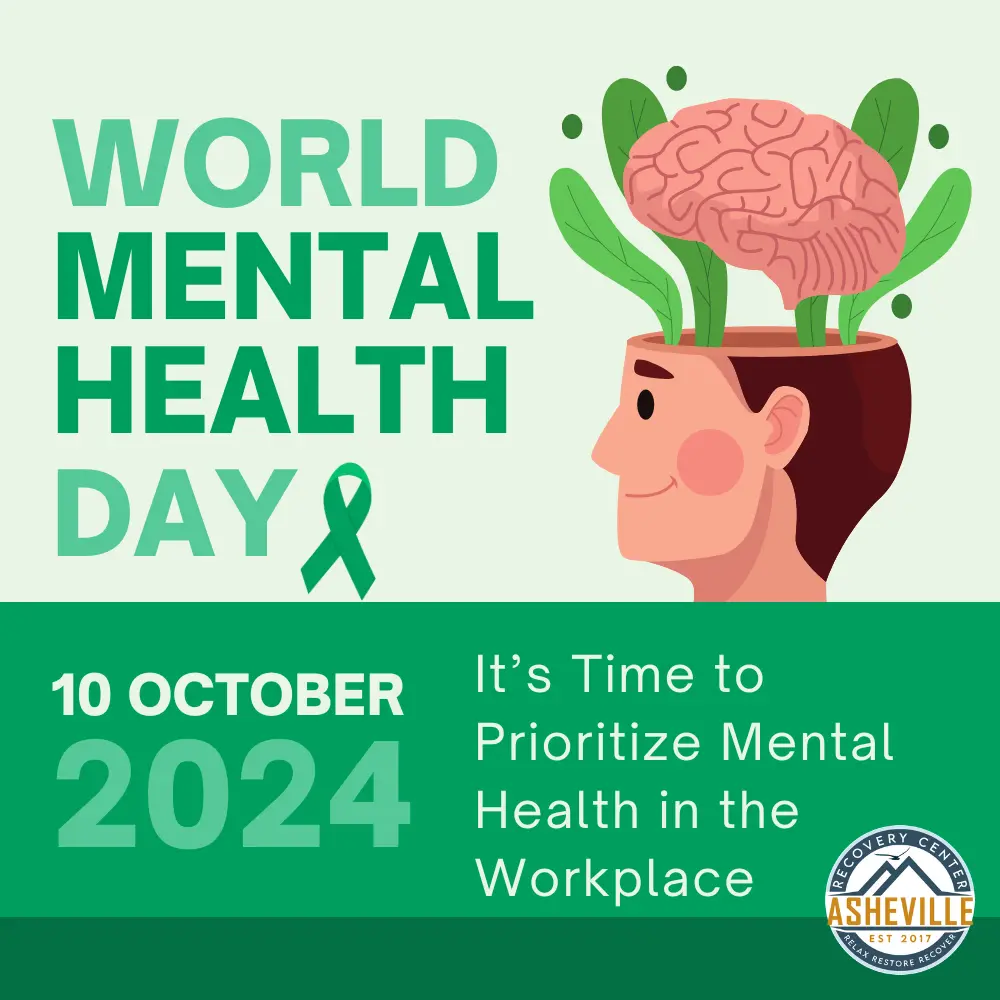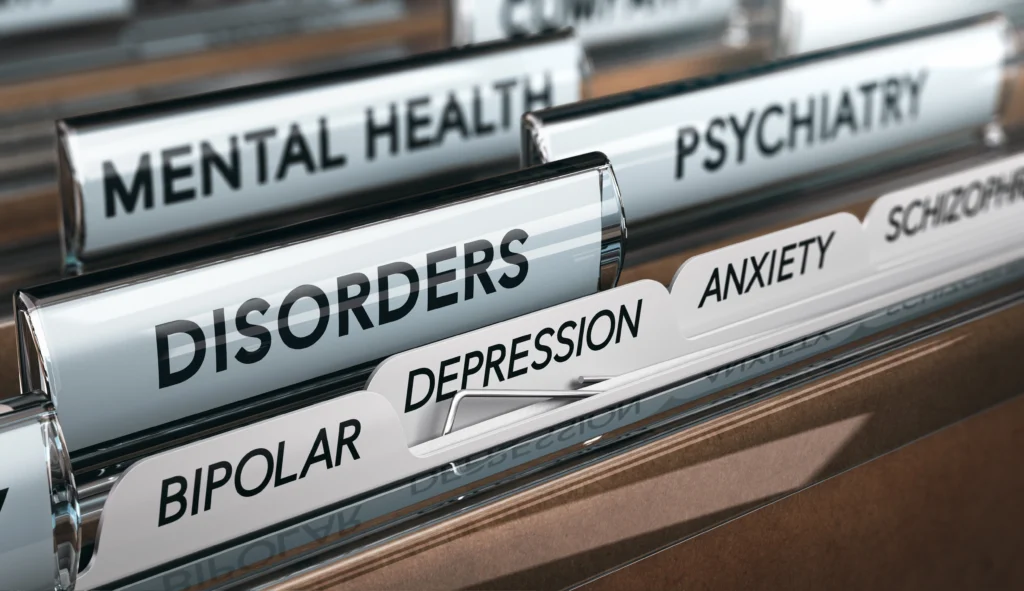Introduction
Every year on October 10th, the world comes together to observe World Mental Health Day, a day dedicated to raising awareness of mental health issues and promoting mental well-being. Established by the World Federation for Mental Health (WFMH) in 1992, this day serves as a global platform to encourage open conversations about mental health and to advocate for better mental health care services. In our modern society, where mental health conditions are increasingly prevalent, especially among young people, it’s more important than ever to address these challenges head-on.
One major concern in the realm of global mental health is the complex connection between mental health issues and addiction. Facilities like us at Asheville Recovery Center are at the forefront of providing quality comprehensive care, helping individuals navigate the complex landscape of mental health and substance abuse.

The Origin of World Mental Health Day
The creation of World Mental Health Day traces back to the vision of the World Federation for Mental Health, an organization committed to global mental health advocacy. Recognizing the urgent need to bring mental health into the spotlight, the WFMH established this day to initiate open conversations about mental illness and to dismantle the stigma that often surrounds it. The inaugural event in 1992 set the stage for an annual tradition that has grown in scope and impact.
Each year, the WFMH selects a theme to focus on specific aspects of mental health. This year’s theme emphasizes prioritizing mental health in the work place, highlighting it as a global priority. By zeroing in on particular issues, the organization aims to catalyze action from individuals, communities, and governments worldwide.
The Importance of Mental Health
Good mental health is foundational to overall well-being. It enables individuals to cope with the normal stresses of life, work productively, and contribute meaningfully to their communities. According to the World Health Organization (WHO), one in four people will be affected by a mental or neurological disorder at some point in their lives. Despite the prevalence of these conditions, stigma and lack of access to mental health support remain significant barriers.
Mental health is not merely the absence of mental disorders; it’s about maintaining a state of balance that allows individuals to realize their abilities and manage life’s challenges. Factors such as stress, genetics, nutrition, and environment can all impact mental health. Practices like self-care, mindfulness, and health promotion activities are essential in fostering mental well-being.
Young People and Mental Health
Young people are particularly vulnerable to mental health issues. The transitional phase of adolescence to adulthood involves significant physical, emotional, and social changes that can make them susceptible to mental health challenges. Academic pressures, social media influences, and the quest for identity contribute to stress and anxiety among youth.
Early intervention is crucial. Providing resources, education, and support can help young individuals navigate these challenges effectively. Schools, communities, and families play a pivotal role in creating environments where mental health is prioritized, and where seeking help is normalized.
Mental Health at Work
The workplace is another critical area where mental health needs attention. Stress, burnout, and work-related pressures can significantly impact an individual’s mental well-being. Employers have a responsibility to prioritize mental health in the workplace by fostering a supportive environment. This includes promoting work-life balance, providing access to mental health services, and encouraging open conversations about mental health.
When organizations invest in their employees’ mental health, they not only enhance individual well-being but also improve overall productivity and job satisfaction. Simple initiatives like mental health days, flexible working hours, and employee assistance programs can make a substantial difference.
The Role of Social Media
In today’s digital age, social media has a profound influence on mental health. While it offers platforms for connection and information sharing, it can also contribute to feelings of inadequacy, anxiety, and depression. The selective nature of online content often presents unrealistic standards that can affect self-esteem, particularly among young people.
Promoting digital literacy and encouraging mindful usage of social media can reduce some of these negative effects. It’s essential to balance online interactions with real-life connections and activities that promote mental well-being.
Mental Health and Addiction: An Intricate Connection
The relationship between mental health and addiction is really complicated and affects many people deeply. When someone is struggling with mental health issues, they might turn to drugs or alcohol to help them cope with their feelings. Unfortunately, this can lead to a cycle where they become dependent on these substances, making their mental health even worse. On the other hand, using drugs or alcohol can actually cause mental health problems or make existing ones more severe because of the changes they cause in the brain.
This two-way relationship between mental health and addiction shows why it’s so important to treat them together. If we only focus on the addiction or just the mental health issue and ignore the other, it often doesn’t work well. To really help someone recover, we need comprehensive care that tackles both problems at the same time.

Asheville Recovery Center: Where Healing Begins
Located in the peaceful mountains of North Carolina, Asheville Recovery Center uses a combined approach to treat both mental health and addiction. Their mission aligns with World Mental Health Day’s goals: to make mental health important and provide treatment options that are easy to access and effective.
- Integrated Mental Health Care – We offer special programs for people dealing with both mental health and addiction issues at the same time. We create personalized treatment plans that address the main causes of both problems, ensuring a complete path to recovery.
- Support for Young People – Understanding the unique challenges that young people face, Asheville Recovery Center provides programs tailored to their specific needs. We use modern therapies and activities that connect with younger individuals, making treatment more engaging and effective.
- Community and Advocacy – Advocacy is a key part of what the Asheville Recovery Center does. By participating in community events and using social media, they raise awareness about mental health issues and spread the message that help is available and recovery is possible.
Resources and Support
- Helpline and First Aid – Immediate assistance is crucial for those in crisis. The center provides a helpline staffed by trained professionals who offer support and guidance. Additionally, they offer mental health first aid training, empowering individuals to assist others in need.
- Collaboration with National Organizations – Partnering with national bodies like the National Alliance on Mental Illness (NAMI), the center enhances its reach and effectiveness. These collaborations facilitate the sharing of resources and best practices, strengthening the support network available to those struggling with mental health and addiction.
Self-Care and Personal Responsibility
While professional help is essential, individuals are also encouraged to take charge of their own mental health. Engaging in self-care activities such as regular exercise, adequate sleep, healthy eating, and mindfulness practices can significantly improve mental well-being. Recognizing personal triggers and stressors, and seeking help early, can prevent minor issues from escalating into serious problems.
Breaking the Stigma
Stigma remains one of the most significant barriers to accessing mental health care especially to men. Misconceptions about mental illness can lead to discrimination and social isolation. By promoting open conversations and educating the public, we can challenge these negative perceptions.
Campaigns on social media, community forums, and educational programs are effective ways to spread awareness. Encouraging stories of recovery and resilience can inspire others to seek help and reduce feelings of shame or embarrassment.
Conclusion
On this World Mental Health Day, it’s essential to remember that you are not alone. Mental health is a universal human right, and support is available for those who need it. Organizations like the Asheville Recovery Center are dedicated to providing comprehensive care, ensuring that individuals have access to the resources they need to achieve good mental health.
By having open conversations, promoting self-care, and advocating for better mental health services, we can make a collective impact. Whether you’re someone struggling with mental health issues, a loved one offering support, or a community member looking to make a difference, every action counts.
Call to Action
Let us use this day as a catalyst for change. Reach out to someone who might be struggling, share resources on social media, or participate in local events that promote mental health. Encourage workplaces to prioritize mental health, and support policies that increase access to mental health care.
Together, we can create a world where mental health is truly all a global priority, and where everyone has the opportunity to thrive.
You can reach Asheville Recovery Center by filling out this form or calling 828-237-4582






